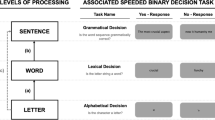Abstract
Two studies relating reading ability to word association responses were carried out. The first involved early readers and matched control children from pre-first-grade classes. There were 29 early readers and 29 nonreading controls matched for age, sex, and IQ. The early readers were found to give significantly more paradigmatic, or same-form-class, responses than the controls. The second study related reading ability, mental age, and word association responses in developmentally delayed teen-agers and young adults, and pre-first-grade children who varied in reading ability. With partial correlation reading ability was found to be related to paradigmatic responding, while mental age was not significantly related. These results indicate that reading acquisition may change word association responses in children through a reorganizing process in the lexicon.
Similar content being viewed by others
References
Becker, C. A. (1979). Semantic context and word frequency effects in visual word recognition.Journal of Experimental Psychology: Human Perception and Performance, 5, 252–259.
Biemiller, A.J. (1970). The development of the use of graphic and contextual information as children learn to read.Reading Research Quarterly, 6, 75–96.
Brown, R. W., & Berko, J. (1960). Word association and the acquisition of grammar.Child Development, 31, 1–14.
Dunn, L.M. (1965).The Peabody Picture Vocabulary Test. Circle Pines, Minnesota: American Guidance Service.
Eisenberg, P., & Becker, C.A. (1982). Semantic context effects in visual word recognition, sentence processing, and reading: Evidence for semantic strategies.Journal of Experimental Psychology: Human Perception and Performance, 8, 739–756.
Entwisle, D.R. (1966).The word association of young children. Baltimore: Johns Hopkins University Press.
Ervin, S.M. (1961). Changes with age in the verbal determinants of word association.American Journal of Psychology, 76, 49–57.
Fischler, I., & Bloom P.A. (1979). Automatic and attentional processes in the effects of sentence contexts on word recognition.Journal of Verbal Learning and Verbal Behavior, 18, 1–20.
Goodman, K.S., & Goodman, Y.M. (1977). Learning about psycholinguistic processes by analyzing oral reading.Harvard Educational Review, 47, 317–333.
Jenkins, J.J. (1954). Psycholinguistics. In C.E. Osgood & T.A. Sebeok (Eds.), Psycholinguistics (Supplement).Journal of Abnormal and Social Psychology 49, 114–116.
Jorm, A.F., & Share, D.L., (1983). Phonological recoding and reading acquisition.Applied Psycholinguistics, 4, 103–147.
Juel, C. (1980). Comparison of word identification strategies with varying contex, word type, and reader skill.Reading Research Quarterly, 3, 358–476.
Keilman, P.A., & Moran, L.J. (1967). Association structures of mental retardates.Multivariate Behavioral Research, 2, 35–45.
Meyer, D.E., & Schvaneveldt, R.W. (1971). Facilitation in recognizing pairs of words: Evidence of a dependence between retrieval operations.Journal of Experimental Psychology, 90, 227–234.
Miller, G.A. (1969). The organization of lexical memory: Are word associations sufficient? In G.A. Talland, & N.C. Waugh (Eds.),The pathology of memory, New York: Academic Press.
Neely, J.H. (1976). Semantic priming and retrieval from lexical memory: Evidence for facilitatory and inhibitory processes.Memory and Cognition, 4, 648–654.
Nelson, K. (1977). The syntagmatic-paradigmatic shift revisited: A review of research and theory.Psychological Bulletin, 84, 93–116.
Olson, D.R. (1977). From utterance to text: The bias of language in speech and writing.Harvard Educational Review, 47, 257–281.
Ramanauskas, S., & Burrow, W. (1973). WISC profiles: Above average and MR good and poor readers.Mental Retardation, 11, 12–14.
Schuberth, R.E., & Eimas, P.D. (1977). Effects of context on the classification of words and nonwords.Journal of Experimental Psychology: Human Perception and Performance, 3, 27–37.
Schvaneveldt, R., Ackerman, B.P., & Semlear, T. (1977). The effect of semantic context of children's word recognition.Child Development, 48, 612–616.
Schwantes, F.M., Boesl, S.L., & Ritz, E.G. (1980). Children's use of context in word recognition: A psycholinguistic guessing game.Child Development, 51, 730–736.
Semmel, M.I., Barritt, L.S., Bennett, S.W., & Perfetti, C.A. (1968). A grammatical analysis of word associations of educable mentally retarded and normal children.American Journal of Mental Deficiency, 72, 567–576.
Sharp, D., & Cole, M. (1972). Patterns of responding in word associations of West African children.Child Development, 43, 55–65.
Sharp, D., Cole, M., & Lave, C. (1979). Education and cognitive development: The evidence from experimental research.Monographs of the Society for Research in Child Development, 44(1–2, Serial N. 178).
Stanovich, K.E., West, R.F., & Feeman, D.J. (1981). A longitudinal study of sentence context effects in second-grade children: Tests of an interactive-compensatory model.Journal of Experimental Child Psychology, 32, 185–199.
Weber, R.M. (1970). A linguistic analysis of first grade reading errors.Reading Research Quarterly, 5, 427–451.
West, R.F., & Stanovich, K.E. (1978). Automatic contextual facilitation in readers of three ages.Child Development, 49, 717–727.
Wildman, D.M., & Kling, M. (1978–1979). Semantic, syntactic, and spatial anticipation in reading.Reading Research Quarterly, 14, 128–164.
Woodcock, R.W. (1973).Woodcock Reading Mastery Tests. Circle Pines, Minnesota: American Guidance Service.
Author information
Authors and Affiliations
Additional information
The authors would like to thank the Halifax and Dartmouth School Boards for their cooperation. We would also like to thank Paul Cable of Special Education, and the principals and teachers: Beth Conrad, Karen Duerdan, Elaine Fram, Peter Montgomery, Wayne Serebrin, and Bill Schipilow. Their help was greatly appreciated. An earlier version of study 1 was presented at the American Psychological Association meeting in Los Angeles, August 1981.
Rights and permissions
About this article
Cite this article
Cronin, V., Pratt, M., Abraham, J. et al. Word association and the acquisition of reading. J Psycholinguist Res 15, 1–11 (1986). https://doi.org/10.1007/BF01067388
Accepted:
Issue Date:
DOI: https://doi.org/10.1007/BF01067388



